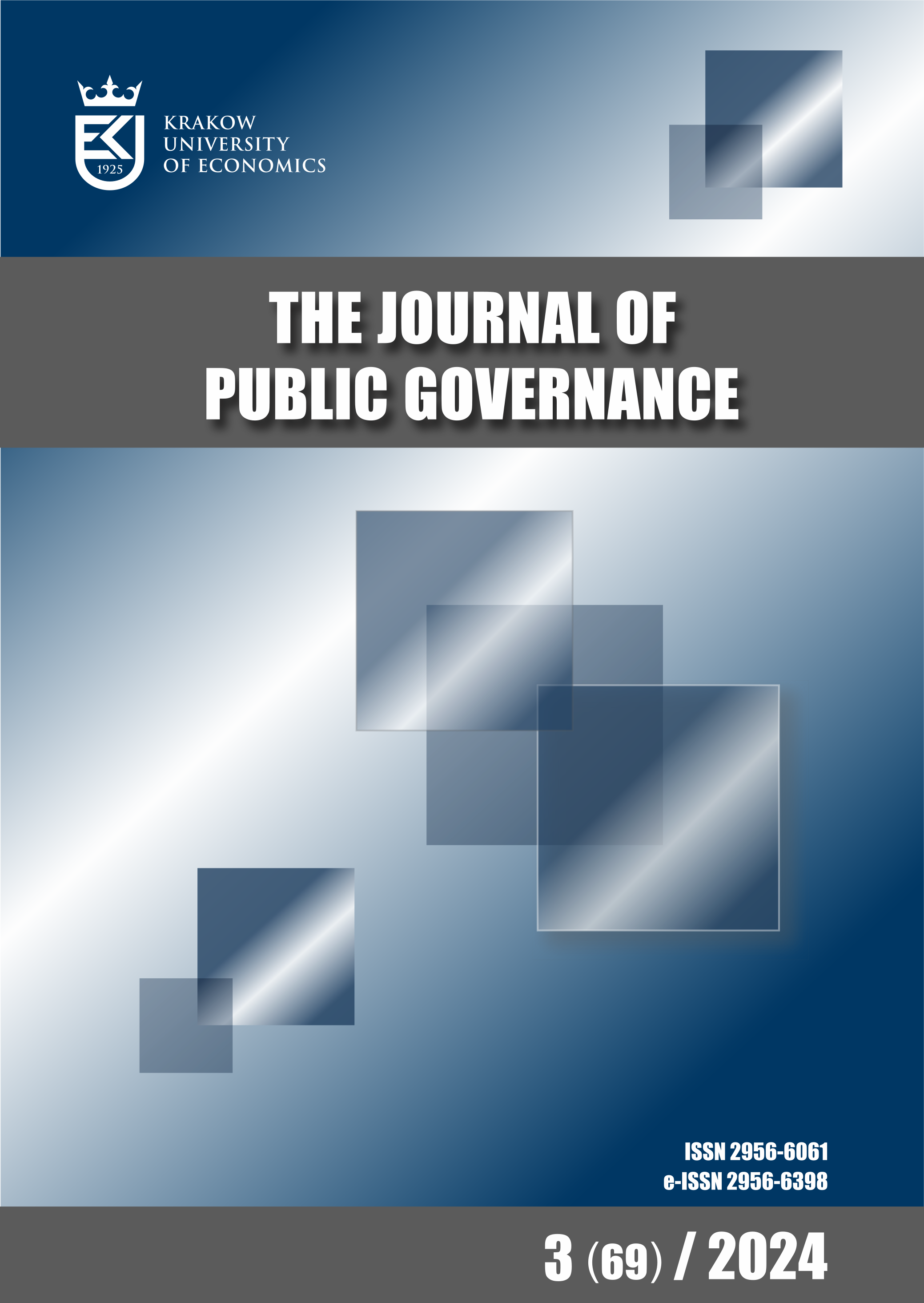The Stimulation of Entrepreneurial Activity During Wartime: The Experience of Ukraine
DOI:
https://doi.org/10.15678/PG.2024.69.3.01Keywords:
entrepreneurship, governmental support, SMEs, governmental grants, loans, businessAbstract
Objective: The article aims to present different governmental methods and tools for the stimulation of entrepreneurial activity in Ukraine during the full-scale war period. The purpose is to emphasise the necessity of SMEs’ governmental support due to the sharp economic decline.
Research Design & Methods: The article uses secondary data analysis, desktop research, case-study method, as well as methods of analysis and synthesis.
Findings: The research suggests that scholars from developed countries underline mainly indirect influence of the state support through creating a favourable environment for fostering SMEs’ growth and performance. On the contrary, scholars from developing countries with transitional economies focus mostly on the direct governmental support, which is the relevant case of Ukraine. These direct methods of support (grants, affordable loans, deregulation) have proved to be efficient since their implementing.
Implications / Recommendations: This paper may be crucial for researchers of entrepreneurship development in transitional economies in crisis periods. Also, it may be useful for policymakers, whose task is to foster economic growth through SMEs.
Contribution / Value Added: This paper benchmarks different approaches of developed and developing countries to the governmental support of SMEs. The article showcases the experience of Ukraine.
Article classification: research article
JEL classification: H7, O52, E650
Downloads
References
Acharya, S. R., & Dixit, T. (2019). Technology Entrepreneurship: Role of Government in Enabling Startup Support Ecosystem. Conference: SSIP Annual Conference on Student Start-ups, Innovation and Ecosystem. Available at: https://www.researchgate.net/publication/333816283_Technology_Entrepreneurship_Role_of_Government_in_Enabling_Startup_Support_Ecosystem [accessed: 15.09.2023].
Ajayi-Nifise, A., et al. (2024). The role of government policy in fostering entrepreneurship: A USA and Africa review. International Journal of Management & Entrepreneurship Research, 6(2), 352–367. DOI: 10.51594/ijmer.v6i2.775
Aziz, M. I., et al. (2021). Modeling Talent Shortage for Entrepreneurship Among Student with Government Policy Support as Mediating Effect: SEM Approach. In B. Alareeni, A. Hamdan, I Elgedawy (Eds.), The Importance of New Technologies and Entrepreneurship in Business Development: In The Context of Economic Diversity in Developing Countries (pp. 2011–2028). Springer. DOI: 10.1007/978-3-030-69221-6_145
Dhanapal, C., et al. (2024). Awareness Among College Students on Government Schemes for Entrepreneurship Development in Bangalore. In R. Khamis & A. Buallay (Eds.), AI in Business: Opportunities and Limitations (vol. 2, pp. 113–125). Springer. DOI:10.1007/978-3-031-49544-1_10
Dligach, A. (2023). Stan ta perspektyvy MSB v Ukraini. Rezultaty doslidzhennia. Economichna Pravda, 01.05. Available at: https://epravda.com.ua/columns/2023/05/01/699634/ [accessed: 16.09.2023].
Fedorchuk, V. (2023). Terra incognita ukrainskoi ekonomiky. Chotyry vysnovky z doslidzhennia serednoho biznesu Instytutu ekonomichnykh doslidzhen. Forbes Ukraine, 31.01. Available at: https://forbes.ua/business/terra-incognita-ukrainskoi-ekonomiki-chotiri-visnovki-z-doslidzhennya-serednogo-biznesu-institutu-ekonomichnikh-doslidzhen-31012024-18884 [accessed: 16.09.2023].
Friedman, B. A. (2011). The Relationship between Governance Effectiveness and Entrepreneurship. International Journal of Humanities and Social Science, 1(17), 221–225.
GEM (Global Entrepreneurship Monitor) (2023). Global Entrepreneurship Monitor 2023/2024 Global Report: 25 Years and Growing. GEM.
Goriunov, D., Samojluk, & M., Kobernik, O. (2023). Business deregulation in Ukraine. Centre of Economic Strategies. Available at: https://ces.org.ua/en/deregulation-of-ukrainian-business-eng/ [accessed: 16.09.2023].
Hushtan, T., & Korsak, R. (2024). The role of state support in the development of the hotel and restaurant business in the context of crisis phenomena and Eurointegration processes. Baltic Journal of Economic Studies, 10(2), 78–84. https://doi.org/10.30525/2256-0742/2024-10-2-78-84
Kaya, H. D. (2019). Government Support, Entrepreneurial Activity and Firm Growth. SocioEconomic Challenges, 3(3), 5–12. http://doi.org/10.21272/sec.3(3).5-12.2019
Кornyluk, R., & Kornyluk, A. (2024). Derzhavna prohrama pidtrymky biznesu «Dostupni kredyty 5–7-9%»: u poshukakh optymalnoho dyzainu. Vox Ukraine. Available at: https://voxukraine.org/derzhavna-programa-pidtrymky-biznesu-dostupni-kredyty-5-7-9-u-poshukah-optymalnogo-dyzajnu [accessed: 19.09.2023].
Leonard, S. (2024). The Impact of Government Subsidies on Entrepreneurial Activities. International Journal of Economic Policy, 4(2), 27–39. DOI:10.47941/ijecop.1764
Luz, A. R. C, Bento, P., et al. (2024). Entrepreneurship performance in the EU: To what extent do economic, social, and government conditions matter? Journal of International Entrepreneurship, 22, 94–116. DOI: 10.1007/s10843-023-00342-5
Musamali, R. A., & Moyi, E. (2022). Gendered Effects of Government Credit Programmes on Entrepreneurship in Kenya. KIPPRA Discussion Paper No. 263. Available at: https://www.researchgate.net/publication/365387022_Gendered_Effects_of_Government_Credit_Programmes_on_Entrepreneurship_in_Kenya [accessed: 14.09.2023].
Minniti, M. (2008). The Role of Government Policy on Entrepreneurial Activity: Productive, Unproductive, or Destructive? Entrepreneurship Theory and Practice, 32(5), 779–790. https://doi.org/10.1111/j.1540-6520.2008.00255.x
Ministry of Economy of Ukraine (2024). Own Business Beta Generic. Available at: https://public.tableau.com/app/profile/me.ukraine/viz/Beta_generic/Dashboard_generic [accessed: 10.09.2023].
Nazarov, V., Hajiyev, J. Mammadova, S. Ahadov, V., & Amanova, S. (2022). The Impact of Entrepreneurship Financial Opportunities and Business Environment on the Country’s Innovation Development and National Wealth. Marketing and Management of Innovations, 4, 94–108. https://doi.org/10.21272/mmi.2022.4-10
Onielowo, T. T. (2024). Exploring the Influence of Government Policy on Entrepreneurship Development. British Journal of Multidisciplinary and Advanced Studies, 5(1), 198–211. DOI: 10.37745/bjmas.2022.0421
Omelianenko, T., & Korotkova, K. (2020). Development of small entrepreneurship and small business in Ukraine: The factors of influence and current trends. Efektyvna ekonomika, 1. DOI: 10.32702/2307-2105-2020.1.9
Perren, L., & Jennings, P. L. (2005). Government Discourses on Entrepreneurship: Issues of Legitimization, Subjugation, and Power. Entrepreneurship Theory and Practice, 29(2), 173–184. https://doi.org/10.1111/j.1540-6520.2005.00075.x
Rahman, A. (2024). Role and involvement of Nepalese government in the upliftment of entrepreneurship. Journal of Management and Entrepreneurship, 3(2). Available at: https://www.researchgate.net/publication/378316417_Role_and_involvement_of_Nepalese_government_in_the_upliftment_of_entrepreneurship [accessed: 19.09.2023].
Ratinho, T., Amezcua, A., Honig, B., & Zeng, Z. (2020). Supporting entrepreneurs: A systematic review of literature and an agenda for research. Technological Forecasting and Social Change, 154, 119956. https://doi.org/10.1016/j.techfore.2020.119956
Sadekin, Md. N. (2023). Role of Competitive Edge, Marketing Facilities, Financial and Government Supports on Small Entrepreneurship Development in Bangladesh. South Asian Journal of Social Sciences and Humanities, 4(5), 73–96. DOI: 10.48165/sajssh.2023.4505
Salami, C. G. E. (2023). Impact of government policy on entrepreneurship growth and development of smallscale business. Journal of Global Social Sciences, 4(14), 73–102. DOI: 10.58934/jgss.v4i14.154
Tae-Ho, Y., & Yen-Yoo, Y. (2020). The Effect of Entrepreneurship on the Sustainability of Social Small and Medium Enterprises (SMEs) – Between the Mediating Effects of Government Support Policy in Korea. Research in World Economy, 11(2), 112. DOI: 10.5430/rwe.v11n2p112
Downloads
Published
Issue
Section
License
Copyright (c) 2024 Authors

This work is licensed under a Creative Commons Attribution 4.0 International License.



